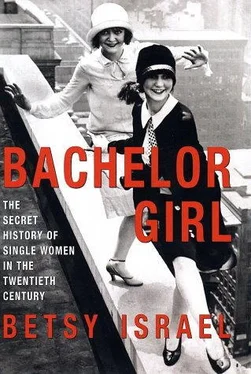smoking, 114–15, 116, 130, 132, 133, 134, 143, 158
Smollett, Tobias, 16–17
Southgate, Eliza, 25
Speck, Richard, 228
spieling, 88–89, 93, 128
spinsters, 9, 14–53, 56, 57, 105–6, 109, 110, 129, 135–36, 190, 197, 219
behavior required of, 23–24
courtesan training proposed for, 21
deportation proposed for, 20–21, 23, 32
Depression era and, 161–62
in early America, 21–25
in 1851 British census, 19–21
in 1855
U.S. census, 23
first appearance of, 15–16, 18
free labor provided by, 139, 186 n
in industrial revolution, 18–21
as insane, 16, 29, 53
lesbians and, 11, 28–29
in literature, 14, 16–17, 19–20, 24, 48–53
maintaining contact among, 50
as widows-manqué, 23 n
work sought by, 18, 19–20, 23, 50
see also new spinsters; old maids
spinster stories, 50–52, 156–57, 262
Stanley, Henry Morton, 62
Stanley, Olga, 112
Stansell, Christine, 58, 71, 89
Stanton, Elizabeth Cady, 33
Steel, Dawn, 250
Steinem, Gloria, 210, 211, 213, 218, 235–37
Sterling, Claire Wellesley, 94
stock-market crash (1929), 147
Stoner, Lucy, 74
Storm, Gale, 196
stronger sex, women as, 172
Suckow, Ruth, 108–9, 163–64
suffrage movement, 74, 100, 114, 117
laws achieved by, 36, 45, 119, 126
political agitation in, 114, 173
Sullivan’s Travels, 155
Swanson, Gloria, 130
sweatshops, 58
syphilis, 68, 123
“Tabitha,” as name, 17
“Tale of Not So Flaming Youth, A” (Kirk), 134–35
tampons, 128, 218
Tarbell, Ida, 50, 115, 117
Tarkington, Booth, 102
tea dances, 120–21
telephone operators, 103 n, 152
Temple, Shirley, 178
Terrible Honesty (Douglas), 127
Thackeray, William Makepeace, 20, 48
Thomas, M. Carey, 26
Thompson, Bertha “Boxcar Bertha,” 154
Thompson, Dorothy, 146 n
Three on a Match, 158–59
Tompkins, Juliet Wilbor, 111–12, 145
Totenberg, Nina, 219
Toward a New Psychology of Women (Miller), 239
Traffic in Souls, 122–23
“transient bureaus,” 154
T. R. Baskin, 231–32
“treating,” 70–71, 88, 94, 135
Triangle Shirtwaist fire, 60
Trilby (Du Maurier), 110, 125
Trollope, Anthony, 48, 262
Trowmart Inn, 105–7
Truman, Harry, 175
tuberculosis, risk of, 136
Types from City Streets (Hapgood), 91
Ugly Girl Papers, The (Power), 69
University of Michigan, 194, 211–12
upper-class women, 117, 124
clothing of, 74–75
department stores and, 85
as domestic employers, 60–61
feminist, 109
muddy hems of, 74, 90
“slumming” by, 93–94
as spinsters, 18–19
urban sketch, 63–64
Ursuline religious order, 34–35
Valentine’s Day, 260
Van de Warker, Ely, 142
Van Ever, Jean, 174–75
Vanity Fair (Thackeray), 48
Viorst, Judith, 226
WACs (Women’s Army Corps), 168–69, 170
Wald, Lillian, 36
war brides, 171, 185
wartime jobs, 164–70
black women in, 166–67
in Civil War, 45, 46–47, 90
competence in, 167–68
for educated women, 165
in films, 167–68
number of, 165, 169
preparatory campaign for separation from, 168–69
propaganda for, 130 n, 165–66
temporary nature of, 167, 168–70
WACs in, 168–69, 170
in World War I, 129, 130, 142–43
Wasserstein, Wendy, 40
Welter, Barbara, 27
Wharton, Edith, 19–20
“What About Alice?” (Cohen), 248
What Should We Do with Our Daughters? (Livermore), 142
“What’s Wrong with Ambition?” (Weaver), 189–90
Wheeton, Ellen “Nelly,” 34
Where Are My Children?, 38–39
white slavery, 122–24, 125
Who’s Who (1902), 116
“Why Women Don’t Marry” (Tompkins), 111–12, 145
widows, 172, 198–99, 209, 235
widows-manqué, 23 n
Wilcox, Susanne, 115
Wilson, Edmund, 129–30
Wine of Youth, 132–33
witches, 17, 197
Wollstonecraft, Mary, 37–38
womanists, 109, 114
Women, The (Luce), 39–40
Women of New York, or Social Life in the Great City, The (Ellington), 77
Women of Steel, 166
Women’s Bureau, U.S., 147, 175
women’s colleges, 26, 114, 143
“women’s” jobs, 103, 150, 152, 170, 178
Women’s Moral Reform Society, 31
women’s movement, 208, 233, 234, 236, 251
see also feminists
Women Who Went to the Field, The (Barton), 47
Wonder Woman, 167
Woolf, Virginia, 110
Wordsworth, William, 17
Work-a-day Girl: A Study of Some Present-Day Conditions, The (Laughlin), 86
Working Girl, 101
World War I, 126, 127, 129, 130, 142–43
World War II, 146 n, 164–70, 178
see also postwar period; wartime jobs
Wright, Fanny, 35
Wylie, Janet, 227–28
Wylie, Philip, 228
Wyman, Jane, 198–99
“yellowback” romance novels, 60
“Yellow Wallpaper, The” (Gilman), 47–48
Yezierska, Anzia, 66–67, 69
Zaharias, Babe Didrikson, 155
Ziegfeld Follies, 94
BETSY ISRAEL is a journalist and former editor who has contributed to the New York Times , Elle , Rolling Stone , GQ , Harper’s Bazaar , Redbook , People , Mademoiselle , Vogue , New York , Spin , Playboy, and the Los Angeles Times , among many others. She is a former columnist for Glamour , US, and New York Woman, and was a contributing writer for Mirabella . She has written numerous screenplays and is the author of a memoir, Grown-Up Fast: A True Story of Teenage Life in Suburban America . She lives in Manhattan with her husband and two children.
Visit www.AuthorTracker.com for exclusive information on your favorite HarperCollins author.
“ Bachelor Girl is such a delectable read that it belies its stature as a profoundly important synthesis. It takes a witty and perceptive stance on the culture, but it’s also a prodigious journalistic investigation that disinters the droll and moving social history of the single woman in America.”
—Marcelle Clements, author of
The Improvised Woman: Single Women Reinventing Single Life
“ Bachelor Girl is essential reading…. It provides a unique framework for understanding today’s single girl.”
—
USA Today
“Ms. Israel’s book provides a useful history of single working girls and new women of all stripes, from the shop girl to the Gibson goddess to the swinging single…. Replete with both Dickensian details and humorous asides.”
—
New York Times
“When it comes to being a bachelor girl, women have long been stuck with a stigma. Author Betsy Israel explains how to defy it.”
—
Cosmopolitan
“Betsy Israel deconstructs all the old ‘single girl’ stereotypes, providing us with a fresh, perceptive point of view and elevating the bachelor girl to her rightful place in modern American social history—and it’s about time.”
—Susan Seidelman, director,
Sex and the City and
Desperately Seeking Susan
“Betsy Israel salutes single womanhood from the last century’s spinsters to the career gals of today.”
Читать дальше












